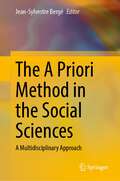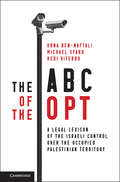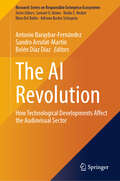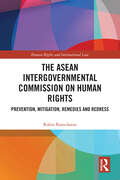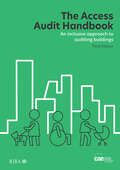- Table View
- List View
The A Priori Method in the Social Sciences: A Multidisciplinary Approach
by Jean-Sylvestre BergéThis edited volume takes a multidisciplinary look at the philosophical concept of a priori. Placing social sciences at the heart of the discussion, this book establishes a dialogue between various disciplines and the different postulates, presuppositions, prejudices, paradigms, beliefs, commonplaces, biases or emotions that forge their theoretical and practical constructs. The book is divided into three parts. Chapters in Part I lay the foundations of a new antecedent approach that revisits the classical approach to a priori and its relationships with law and philosophy. Chapters in Part II extend the analysis to economics and management, on such key topics as blockchain technology, labor, health insurance and innovation. Finally, chapters in Part III turn to anthropology and sociology, to reconsider the core methods of these different disciplines and to nourish reflection on the basis of new working hypotheses.
The ABA Complete and Easy Guide to Health Care Law
by American Bar AssociationThe ABA Complete and Easy Guide to Health Care Law is a comprehensive guide to understanding your rights as a patient and knowing how to move through the health care system. This guide allows you to understand issues about health care to the fullest. Among the issues covered are:Patients' Rights: Confidentiality, Privacy, and the Patient's Bill of Rights; Emergency Care; Informed Consent Paying for Medical Care: Insurance and Managed Care; COBRA Reproduction: Assisted Reproductive Technology; Wrongful Birth and Wrongful Pregnancy; Sterilization; Abortion People with Disabilities: Pregnancy; Confidentiality and Disclosure; Vaccinations; Mandatory Testing; Denoting Tort Liability; Quarantine Nursing Homes: Choosing a Nursing Home; Paying for Long-Term Care; Medicaid Planning; Alternative Care and Living Regulating Medical Professionals: Licensing of Doctors, Nurses, and Hospitals; Medical Malpractice; Research on Humans Death and Dying: Right to Refuse Life-Sustaining Treatment; Hospices; Donating Your Organs; Assisted SuicidFrom the Trade Paperback edition.
The ABC of the OPT: A Legal Lexicon Of The Israeli Control Over The Occupied Palestinian Territory
by Michael Sfard Hedi Viterbo Orna Ben-NaftaliIsrael's half-a-century long rule over the West Bank and Gaza Strip, and some of its surrounding legal issues, have been the subject of extensive academic literature. Yet, to date, there has been no comprehensive, theoretically-informed, and empirically-based academic study of the role of various legal mechanisms, norms, and concepts in shaping, legitimizing, and responding to the Israeli control regime. <P><P>This book seeks to fill this gap, while shedding new light on the subject. Through the format of an A-Z legal lexicon, it critically reflects on, challenges, and redefines the language, knowledge, and practices surrounding the Israeli control regime. Taken together, the entries illuminate the relation between global and local forces - legal, political, and cultural - in Israel and Palestine. The study of the terms involved provides insights that are relevant to other situations elsewhere in the world, particularly with regard to belligerent occupation, the law's role in relation to state violence, and justice.<P> Offers a case study relevant to other examples of occupation, such as Iraq and Crimea.<P> Uses a lexicon format to analyze key legal and political concepts relating to Israel's control over the West Bank and Gaza Strip.<P> Aimed at academics and practitioners in the fields of international law, jurisprudence, and political science.
The ABCs of Not-For-Profit Accounting and Financial/990 Reporting
by Laurence ScotWritten in non-complicated prose and reducing complex rules to easily understandable concepts, this book offers a fundamental understanding of how not-for-profit (NFP) organizations are formed, their structure, and the unique accounting and reporting issues they face. In the United States, the NFP sector accounts for just over 10 percent of all private sector workers, and NFPs must comply with hundreds of rules imposed by the IRS, federal and state government agencies, foundations, and even donors. Yet there is a dearth of informative guidance, and a shortage of knowledgeable bookkeepers and accountants who understand the nuances of NFP accounting and financial reporting. Neither overly technical nor complex, this comprehensive and easy-to-read practical guide provides desperately needed information to a wide range of NFP stakeholders such as those who handle the bookkeeping and accounting functions, manage an NFP organization, provide funds or services to NFPs, or regulate NPF organizations. It covers topics such as the four required NFP financial statements, accounting for different types of revenue including conditional, restricted, and in-kind donations and sponsorships, IRS reporting on forms 990, 990-T and 990-PF, and how to understand and prepare for different types of audits.Including a glossary of important terms that are vital to running a successful NFP, and drawn from the author’s decades of experience focused solely on the NFP sector, this is an indispensable guide for NFP leaders and staff, donors and grantors, regulatory agencies, consultants, accountants, bookkeepers, bankers, and any professionals whose work intersects the NFP sector.
The ACTA and the Plurilateral Enforcement Agenda
by Pedro Roffe Xavier SeubaThe Anti-Counterfeiting Trade Agreement (ACTA) is the most important effort undertaken to lay down a plurilateral legal framework for the enforcement of intellectual property rights. With the view to learn more about the origins of this treaty, the process leading to its conclusion and its implications for law making in this field, The ACTA and the Plurilateral Enforcement Agenda: Genesis and Aftermath analyses in great depth both the context and the content of the agreements. In order to attain this objective, a large and diverse group of experts - renowned scholars, policy makers and civil society actors - who represent different perspectives on the necessary balance between intellectual property enforcement and other economic and social interests have been gathered together. This book is the most comprehensive analysis of ACTA, and of its relation with ongoing initiatives to improve enforcement of intellectual property and norms pertaining to a range of international legal regimes, conducted so far.
The AI Con: How to Fight Big Tech's Hype and Create the Future We Want
by Emily M. Bender Alex HannaA smart, incisive look at the technologies sold as artificial intelligence, the drawbacks and pitfalls of technology sold under this banner, and why it’s crucial to recognize the many ways in which AI hype covers for a small set of power-hungry actors at work and in the world. Is artificial intelligence going to take over the world? Have big tech scientists created an artificial lifeform that can think on its own? Is it going to put authors, artists, and others out of business? Are we about to enter an age where computers are better than humans at everything?The answer to these questions, linguist Emily M. Bender and sociologist Alex Hanna make clear, is “no,” “they wish,” “LOL,” and “definitely not.” This kind of thinking is a symptom of a phenomenon known as “AI hype.” Hype looks and smells fishy: It twists words and helps the rich get richer by justifying data theft, motivating surveillance capitalism, and devaluing human creativity in order to replace meaningful work with jobs that treat people like machines. In The AI Con, Bender and Hanna offer a sharp, witty, and wide-ranging take-down of AI hype across its many forms.Bender and Hanna show you how to spot AI hype, how to deconstruct it, and how to expose the power grabs it aims to hide. Armed with these tools, you will be prepared to push back against AI hype at work, as a consumer in the marketplace, as a skeptical newsreader, and as a citizen holding policymakers to account. Together, Bender and Hanna expose AI hype for what it is: a mask for Big Tech’s drive for profit, with little concern for who it affects.
The AI Revolution: How Technological Developments Affect the Audiovisual Sector (Research Series on Responsible Enterprise Ecosystems)
by Belén Díaz Díaz Antonio Baraybar-Fernández Sandro Arrufat-MartínThis book presents an overview of the vast landscape of artificial intelligence (AI) in the media industry, more specifically in the audiovisual sector.Readers are guided through the fundamental pillars of AI, from machine learning algorithms to advanced neural networks, revealing the technological foundations that drive innovation in the field of communication and media. The possibilities of AI in this area are explored and discussed with real case studies. The book highlights not only the technological developments, but also the ethical dilemmas that arise. From privacy issues to equity in access to education, the book provides a comprehensive view of the challenges that must be addressed to ensure the ethical and sustainable development of artificial intelligence. Altogether, this book illuminates how AI continues to transform the way we communicate, learn, and relate to technology.
The AI-Centered Enterprise: Reshaping Organizations with Context Aware AI
by Amit Joshi Ram Bala Natarajan BalasubramanianThe explosion of generative AI has sparked a wave of case studies showing how quickly and profoundly it is transforming businesses. Yet most of these use cases still apply the technology to enhancing existing systems. This book makes the case for why business leaders must revisit the fundamentals of generative AI and look beyond short-term, tactical gains. Tools like ChatGPT mark just the beginning of Context Aware AI—systems that grasp both the content and intent of unstructured human input. Drawing on real-world examples and academic research, we demonstrate how Context Aware AI can enhance organizational interactions, unlock new forms of collaboration, and usher in the era of the AI-Centered Enterprise. By augmenting baseline Large Language Models (LLMs) with techniques like prompt engineering, retrieval-augmented generation (RAG), knowledge graphs, and notably agentic systems, organizations can build customized tools that adapt to individual users’ thinking patterns and the collaborative workflows they are a part of. We present a practical framework—the 3Cs: Calibrate, Clarify, Channelize, to help leaders navigate this radical shift across multiple levels of organizations.
The ASEAN Intergovernmental Commission on Human Rights: Prevention, Mitigation, Remedies and Redress (Human Rights and International Law)
by Robin RamcharanThis book systematically documents the practice of the ASEAN Intergovernmental Commission on Human Rights (AICHR) on the protection of human rights. It provides a template of universal standards, spanning prevention, response and mitigation, and redress and remedies, from which to gauge the performance of the AICHR. The evidence points to a Commission that leaves much to be desired and whose protective function needs significant improvement. Nevertheless, the National Representatives of Member States to the AICHR have taken important and positive steps that lay the groundwork for a more protection-oriented Commission. The work offers avenues for the National Representatives, the ASEAN Member States and civil society to enhance the protection function of the AICHR and to thus more closely align it with hard-won international standards and best practices. The book will be of interest to representatives of the AICHR, human rights practitioners, ASEAN policymakers, and academics, students, researchers and policymakers in the areas of international relations, human rights law and Asian studies.
The Aarhus Convention: Towards Environmental Solidarisation (Environmental Politics and Theory)
by Duncan WeaverThe Aarhus Convention on access to information, public participation in decision-making and access to justice in environmental matters has been celebrated as a pioneering international environmental agreement. Given that a quarter-century has passed since Aarhus was opened for signature, now is an opportune moment to revisit it from a fresh perspective. Marking this anniversary, this book explores Aarhus from the vista of the English School of International Relations, an ethically-minded perspective used to gauge the prevalence of state-oriented and human-oriented progress from the Convention's rationales and realities. It firstly considers Aarhus' propagation, investigating the legal, diplomatic and geopolitical contexts enabling its emergence. It secondly investigates Aarhus' germination, with reference to its trinity of procedural rights. Thirdly, the book examines the Convention's growth, in terms of the development of its organisational infrastructure. The chief finding is that Aarhus demonstrates, in environmental contexts, the feasibility and benefit of fostering 'humankind' solidarist progress, rooted in moral cosmopolitanism, within the existing power arrangements of a sovereignty-based pluralism. Pluralist concerns for diversity and international order are found to be a precondition for more ethically ambitious solidarist endeavours. These observations reinforce the logic of solidarisation, an English School innovation that presents sovereignty as (a) being ethically matured by solidarism whilst (b) delimiting solidarism within the threshold of states' tolerance.
The Abduction
by Mark GimenezWhen hotshot lawyer Elizabeth Brice turns up to collect her daughter Grace from football practice, the coach tells her she needn't have bothered, as Grace's uncle has already picked her up.The only problem is - Grace has no uncles.And so begins a furious race against time to save Grace from unknown kidnappers. Grace's internet geek father John leads the search, forced to unite with his terrifying wife and even more terrifying father Ben, a battle-hardened Vietnam veteran. Somehow they must find Grace before it is too late. But secrets from the past make the little girl's survival more uncertain with every passing minute...A riveting, action-packed thriller, The Abduction will have you on the edge of your seat from the first page to the last.
The Abduction
by Mark GimenezWhen hotshot lawyer Elizabeth Brice turns up to collect her daughter Grace from football practice, the coach tells her she needn't have bothered, as Grace's uncle has already picked her up.The only problem is - Grace has no uncles.And so begins a furious race against time to save Grace from unknown kidnappers. Grace's internet geek father John leads the search, forced to unite with his terrifying wife and even more terrifying father Ben, a battle-hardened Vietnam veteran. Somehow they must find Grace before it is too late. But secrets from the past make the little girl's survival more uncertain with every passing minute...A riveting, action-packed thriller, The Abduction will have you on the edge of your seat from the first page to the last.
The Aboriginal Tent Embassy: Sovereignty, Black Power, Land Rights and the State
by Gary Foley Andrew Schaap Edwina HowellThe 1972 Aboriginal Embassy was one of the most significant indigenous political demonstrations of the twentieth century. What began as a simple response to a Prime Ministerial statement on Australia Day 1972, evolved into a six-month political stand-off between radical Aboriginal activists and a conservative Australian government. The dramatic scenes in July 1972 when police forcibly removed the Embassy from the lawns of the Australian Houses of Parliament were transmitted around the world. The demonstration increased international awareness of the struggle for justice by Aboriginal people, brought an end to the national government policy of assimilation and put Aboriginal issues firmly onto the national political agenda. The Embassy remains today and on Australia Day 2012 was again the focal point for national and international attention, demonstrating the intensity that the Embassy can still provoke after forty years of just sitting there. If, as some suggest, the Embassy can only ever be removed by Aboriginal people achieving their goals of Land Rights, Self-Determination and economic independence then it is likely to remain for some time yet. ‘This book explores the context of this moment that captured the world’s attention by using, predominantly, the voices of the people who were there. More than a simple oral history, some of the key players represented here bring with them the imprimatur of the education they were to gain in the era after the Tent Embassy. This is an act of radicalisation. The Aboriginal participants in subversive political action have now broken through the barriers of access to academia and write as both eye-witnesses and also as trained historians, lawyers, film-makers. It is another act of subversion, a continuing taunt to the entrenched institutions of the dominant culture, part of a continuum of political thought and action.’ (Larissa Behrendt, Professor of Law, Jumbunna Indigenous House of Learning, University of Technology Sydney)
The Abortion Act 1967: A Biography of a UK Law (Law in Context)
by Clare Parker Gayle Davis Sally Sheldon Jane O'NeillThe Abortion Act 1967 may be the most contested law in UK history, sitting on a fault line between the shifting tectonic plates of a rapidly transforming society. While it has survived repeated calls for its reform, with its text barely altered for over five decades, women's experiences of accessing abortion services under it have evolved considerably. Drawing on extensive archival research and interviews, this book explores how the Abortion Act was given meaning by a diverse cast of actors including women seeking access to services, doctors and service providers, campaigners, judges, lawyers, and policy makers. By adopting an innovative biographical approach to the law, the book shows that the Abortion Act is a 'living law'. Using this historically grounded socio-legal approach, this enlightening book demonstrates how the Abortion Act both shaped and was shaped by a constantly changing society.
The Absence of Guilt (A. Scott Fenney)
by Mark GimenezMark Gimenez, author the massive international bestseller The Colour of Law, is back, as superstar lawyer Scott A. Fenney takes the stand for an impossible case. An ISIS attack on America is narrowly averted when the FBI uncovers a plot to detonate a weapon of mass destruction in Dallas, Texas during the Super Bowl.A federal grand jury indicts twenty-four co-conspirators, including Omar al Mustafa, a notorious and charismatic Muslim cleric known for his incendiary anti-American diatribes on YouTube and Fox News. His arrest is greeted with cheers around the world and relief at home. The President goes on national television and proclaims: 'We won!'There is only one problem: there is no evidence against Mustafa. That problem falls to the presiding judge, newly appointed U.S. District Judge A. Scott Fenney.If Mustafa is innocent, Scott must set the most dangerous man in Dallas free, with no idea who is really guilty.And with just three weeks before the attack is due . . .
The Absence of Guilt (A. Scott Fenney)
by Mark GimenezMark Gimenez, author the massive international bestseller The Colour of Law, is back as superstar lawyer Scott A. Fenney takes the stand for an impossible case.An ISIS attack on America is narrowly averted when the FBI uncovers a plot to detonate a weapon of mass destruction in Dallas, Texas during the Super Bowl.A federal grand jury indicts twenty-four co-conspirators, including Omar al Mustafa, a notorious and charismatic Muslim cleric known for his incendiary anti-American diatribes on YouTube and Fox News. His arrest is greeted with cheers around the world and relief at home. The President goes on national television and proclaims: 'We won!'There is only one problem: there is no evidence against Mustafa. That problem falls to the presiding judge, newly appointed U.S. District Judge A. Scott Fenney.If Mustafa is innocent, Scott must set the most dangerous man in Dallas free, with no idea who is really guilty.And all with just three weeks to go before the attack is due . . .
The Absolute Beginner's Guide to Cross-Examination
by Samuel A. SternWritten by an experienced trial lawyer, this book will help you understand the art of cross-examination. Not only will it prepare you for the courtroom, but it will also help you become a successful lawyer.One of the most well-known courtroom situations, the cross-examination is the formal interrogation of a witness called by the other party in a court of law to challenge or extend testimony already given. It is the prosecutor or defense attorney's opportunity to strengthen his or her own case by questioning the opposite side's witness. To do so with expertise, calm, and finesse is a hard-learned but invaluable skill.In The Absolute Beginners Guide to Cross-Examination, trial lawyer and teacher Samuel A. Stern demonstrates that conducting an effective cross-examination is a learned skill and that his comprehensive teachings are its foundation. This contemporary and clear guide is designed so that you can quickly and effectively cross-examine.Learn how to successfully cross-examine a witness in this easy-to-read, step-by-step guide. This book will be a integral addition to the shelf of every law student, lawyers who have newly passed the bar exam, law professors, and even seasoned practicing lawyers. Cross-examination is an art, and Stern teaches you the finest aspects of it in The Absolute Beginners Guide to Cross-Examination.
The Abuse of Conscience: A Century of Catholic Moral Theology
by Matthew LeveringHow important is conscience for the Christian moral life? In this book, Matthew Levering surveys twentieth-century Catholic moral theology to construct an argument against centering ethics on conscience. He instead argues that conscience must be formed by the revealed truths of Scripture as interpreted and applied in the church. Levering shows how conscience-centered ethics came to be—both prior to and following the Second Vatican Council—and how important voices from both the Catholic and Protestant communities criticized the primacy of conscience in favor of an approach that considers conscience within the broader framework of the Christian moral organism. Rather than engaging with current hot-button issues, Levering presents and deconstructs the work of twenty-six noteworthy theologians from the recent past in order to work through core matters. He begins by examining the place of conscience in Scripture and in the Catholic &“moral manuals&” of the twentieth century. He then explores the rebuttals to conscience-centered ethics offered by pre- and post-conciliar Thomists and the emergence of a new, even more problematic conscience-centered ethics in German thought. Amid this wide-ranging introduction to various strands of Catholic moral theology, Levering crafts an incisive intervention of his own against the abuse of conscience that besets the church today as it did in the last century.
The Abuse of Minors in the Catholic Church: Dismantling the Culture of Cover Ups (Routledge Studies in Religion)
by Lluis Oviedo Anthony J. BlasiThis book offers an academically rigorous examination of the biological, psychological, social and ecclesiastical processes that allowed sexual abuse in the Catholic Church to happen and then be covered up. The collected essays provide a means to better assess systemic wrongdoing in religious institutions, so that they can be more effectively held to account. An international team of contributors apply a necessarily multi-disciplinary approach to this difficult subject. Chapters look closely at the sexual abuse of minors by Roman Catholic clerics, explaining the complexity of this issue, which cannot be reduced to simple misconduct, sexual deviation, or a management failure alone. The book will help the reader to better understand the social, organizational, and cultural processes in the Church over recent decades, as well as the intricate world of beliefs, moral rules, and behaviours. It concludes with some strategies for change at the individual and corporate levels that will better ensure safeguarding within the Catholic Church and its affiliate institutions. This multifaceted study gives a nuanced analysis of this huge organizational failure and offers recommendations for effective ways of preventing it in the future. As such, it will be of keen interest to scholars of Religious Studies, Sociology of Religion, Psychology, Psychiatry, Legal Studies, Ethics, Anthropology, Cultural Studies, History, and Theology.
The Abuse of Power: Confronting Injustice in Public Life
by Theresa MayFormer Prime Minister Theresa May exposes the abuse of power by public institutions and politicians in a series of riveting first-hand accounts from her time in office.As Prime Minister for three years and Home Secretary for six years, Theresa May confronted a series of issues in which the abuse of power led to devastating results for individuals and significantly damaged the reputation of, and trust in, public institutions and politicians. From the Hillsborough and Grenfell tragedies, to the Daniel Morgan case and parliamentary scandals, the powerful repeatedly chose to use their power not in the interests of the powerless but to serve themselves or to protect the organisation to which they belonged.The Abuse of Power is a searing exposé of injustice and an impassioned call to exercise power for the greater good. Drawing on examples from domestic and international affairs she was personally involved in at the highest level, including Stop and Search and the Salisbury Poisonings, the former prime minister argues for a radical rethink in how we approach our politics and public life.(P)2023 Headline Publishing Group Limited
The Abuse of Power: Confronting Injustice in Public Life
by Theresa MayAs Prime Minister for three years and Home Secretary for six years, Theresa May confronted a series of issues in which the abuse of power led to devastating results for individuals and significantly damaged the reputation of, and trust in, public institutions and politicians. From the Hillsborough and Grenfell tragedies, to the Daniel Morgan case and parliamentary scandals, the powerful repeatedly chose to use their power not in the interests of the powerless but to serve themselves or to protect the organisation to which they belonged.The Abuse of Power is a searing exposé of injustice and an impassioned call to exercise power for the greater good. Drawing on examples from domestic and international affairs she was personally involved in at the highest level, including Stop and Search and the Salisbury Poisonings, the former prime minister argues for a radical rethink in how we approach our politics and public life.
The Abuse of Power: Confronting Injustice in Public Life
by Theresa MayAs Prime Minister for three years and Home Secretary for six years, Theresa May confronted a series of issues in which the abuse of power led to devastating results for individuals and significantly damaged the reputation of, and trust in, public institutions and politicians. From the Hillsborough and Grenfell tragedies, to the Daniel Morgan case and parliamentary scandals, the powerful repeatedly chose to use their power not in the interests of the powerless but to serve themselves or to protect the organisation to which they belonged.The Abuse of Power is a searing exposé of injustice and an impassioned call to exercise power for the greater good. Drawing on examples from domestic and international affairs she was personally involved in at the highest level, including Stop and Search and the Salisbury Poisonings, the former prime minister argues for a radical rethink in how we approach our politics and public life.
The Abusive Customer: Breaking the Silence Around Customers’ Aggressive Behavior
by Ivaylo YorgovBreaking the silence around an all-too-common problem, this book offers insights into the triggers of customer aggression against service employees, explores its consequences, and provides practical advice for handling abusive customers and mitigating the damage they inflict. Today, more than half of the world’s population is employed in the service sector. This fundamental economic shift is accompanied by heightened attention to customer service and the ‘customer is always right’ paradigm. But when customers act aggressively, everyone pays a price: frontline employees, their families, their companies, and even the abusive customers themselves. Unlike breezier titles on the subject, this book is based in academic research—exploring the ‘why?’ and ‘when?’ behind abusive behavior—that underpins its practical approach, illustrated with real-world stories from professionals on the front lines of customer service. The book’s useful tools include a sample anti-customer abuse policy and management process, a cheat sheet of practices that work for handling its consequences, a summary of effective service recovery processes and practices, and abuse-handling training list and curriculum templates. Managers and workers in customer-facing roles, in industries such as retail, hospitality, tourism, banking, and contact centers, will welcome this essential resource as part of their efforts to stop aggressive customer behavior, and improve employee morale, job satisfaction, and engagement.
The Access Audit Handbook: An inclusive approach to auditing buildings
by (CAE) Centre for Accessible EnvironmentsOur buildings and environments should be inclusive to all, but how can we assess this? The Access Audit Handbook is an indispensable tool for auditing the accessibility of buildings and services. This book offers straightforward advice about undertaking access audits and explains how they make buildings, environments and services more inclusive. Following the audit, the book explains how each of the various report formats works best to communicate recommendations in the content of current legislation, funding requirements and best practice in building management. Well established as the best resource for conducting access audits, the third edition of The Access Audit Handbook is fully up to date with the latest legal and technical standards as well as developments in equipment and building maintenance. Featuring advice on: Commissioning an access audit Audit methodology Making recommendations Report writing The practical guidance is supported by case studies, worked examples and checklists.
The Accidental History of the U.S. Immigration Courts: War, Fear, and the Roots of Dysfunction
by Alison PeckHow the immigration courts became part of the nation’s law enforcement agency—and how to reshape them. During the Trump administration, the immigration courts were decried as more politicized enforcement weapon than impartial tribunal. Yet few people are aware of a fundamental flaw in the system that has long pre-dated that administration: The immigration courts are not really "courts" at all but an office of the Department of Justice—the nation’s law enforcement agency. This original and surprising diagnosis shows how paranoia sparked by World War II and the War on Terror drove the structure of the immigration courts. Focusing on previously unstudied decisions in the Roosevelt and Bush administrations, the narrative laid out in this book divulges both the human tragedy of our current immigration court system and the human crises that led to its creation. Moving the reader from understanding to action, Alison Peck offers a lens through which to evaluate contemporary bills and proposals to reform our immigration court system. Peck provides an accessible legal analysis of recent events to make the case for independent immigration courts, proposing that the courts be moved into an independent, Article I court system. As long as the immigration courts remain under the authority of the attorney general, the administration of immigration justice will remain a game of political football—with people’s very lives on the line.
